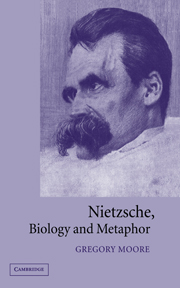Conclusion
Published online by Cambridge University Press: 22 September 2009
Summary
‘No man’, wrote one of Nietzsche's favourite writers, the American Transcendentalist Ralph Waldo Emerson,
can quite emancipate himself from his age and country, or produce a model in which the education, the religion, the politics, usages, and arts of his times shall have no share. Though he were never so original, never so wilful and fantastic, he cannot wipe out of his work every trace of the thoughts amidst which it grew. The very avoidance betrays the usage he avoids.
Throughout this study, I have been arguing that Nietzsche, whatever he may have claimed to the contrary, is no exception to this rule. Perhaps this sounds like a truism – after all, no thinker writes in a cultural or an ideological vacuum, and this must be as true of Nietzsche as of anybody else. But it is the extent to which this philosopher, who liked to portray himself as living in self-imposed alpine exile ‘6,000 feet above man and time’, who saw himself as waging war against all that was ignoble and decadent in his culture; it is the extent to which Nietzsche failed to ‘emancipate himself from his age and country’ and remained a nineteenth-century thinker, sharing the hopes and fears of the fin de sièecle and participating in a wide range of contemporary debates – it is this aspect of his philosophy that modern critics, especially in the English-speaking world, have tended to ignore.
- Type
- Chapter
- Information
- Nietzsche, Biology and Metaphor , pp. 193 - 211Publisher: Cambridge University PressPrint publication year: 2002



